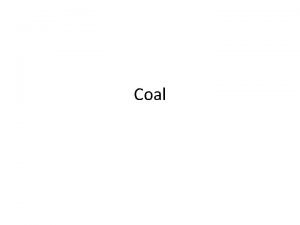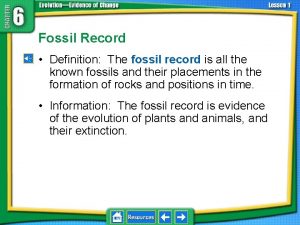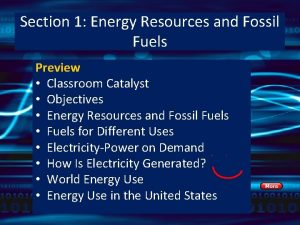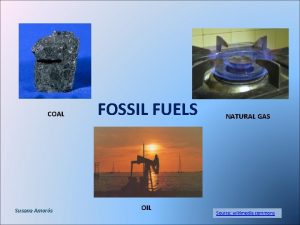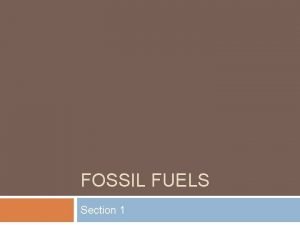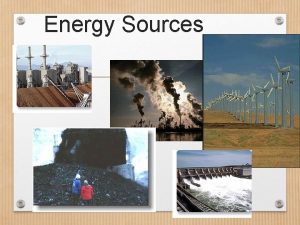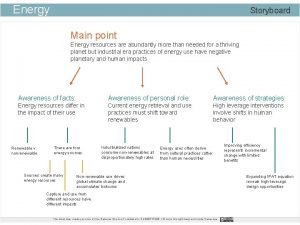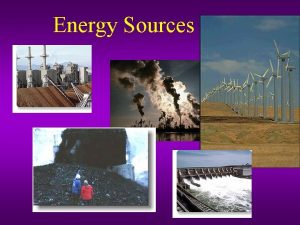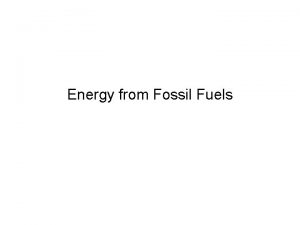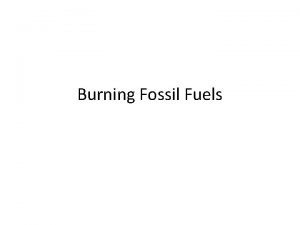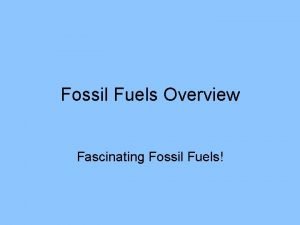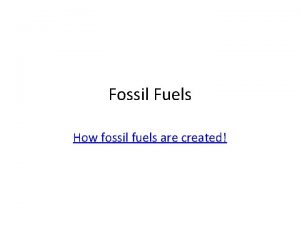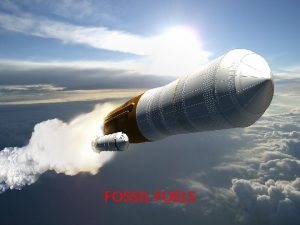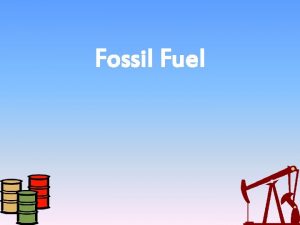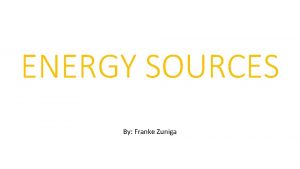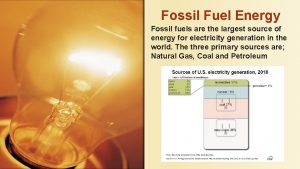Fossil Fuel What are fossil fuel Fossil fuel












- Slides: 12

Fossil Fuel



What are fossil fuel • Fossil fuel are hydrocarbons, primarily coal, fuel oil or natural gas formed from the remains of dead plants and animals. • After food, fossil fuel is humanity's most important source of energy. There are three major fuels : 1. Coal 2. Oil 3. Natural Gas.

Fossil fuel –crude oil • As found in the earth, oil may have a variety of properties. Some forms are black, others dark green, and some light like kerosene. The liquid ranges from very viscous to easy-flowing. Crude oil usually consists of a mixture of hydrocarbons having varying molecular weights and differing from one another in structure and properties.

Fossil fuel –crude oil • These various species are separated into groups, or fractions, by a process of distillation called refining. Oil fuel, in all of its usable forms, is a refined product, unlike coal and natural gas which can often be burned in their natural condition.

Fossil fuel –crude oil • Petroleum is a mixture of liquid hydrocarbons (chemical compounds containing only hydrogen and carbon) plus various impurities such as sulfur. Unprocessed petroleum is usually called crude oil, although it has been called mineral oil and Seneca oil, named for the Seneca Indians of Western Pennsylvania.

Fossil fuel –crude oil • The name petroleum is from a combination of Latin words meaning "rock oil". We refer to it here simply as oil.

Use of oil • Oil is used primarily in the form of gasoline and deisel to power vehicles. eg cars, trucks, buses, boats, trains and planes run on oil. • Oil are also used to power portable devices and stationery engines. • It is beyond the scope of this lesson to go into detail on the use of oil

Disadvantage of oil • Oil spills • Oil removed by microbes, evaporation and photo oxidation process • Emissions

Advantage of oil • • • It has high energy density. Production systems are simple Storage and transportation systems are simple For transportation it feeds an established distribution bas Safety hazards (and safe handling procedures) are well understood • Systems for use as a fuel are simple • Spills and leaks are controllable using existing technology • As raw material in chemical synthesis it is extremely flexible

• • • Formation of fossil fuel http: //www. youtube. com/watch? v=_8 Vq. WKZIPr. M What are fossils and how do they form http: //www. youtube. com/watch? v=c_DCP 4 c. LVNg Crude - The Incredible Journey Of Oil http: //www. youtube. com/watch? v=c. Pgfnwi 2 m 9 M How petroleum exploration and refining process http: //www. youtube. com/watch? v=8 W 8 SW 98 -s. XQ Oil Refinery Demonstrative http: //www. youtube. com/watch? v=zv. V 2 s. SMny. KU
 Antigentest åre
Antigentest åre What the most abundant fossil fuel
What the most abundant fossil fuel Fossil record definition
Fossil record definition Fossil fuels deposits
Fossil fuels deposits How does fossil fuel produce energy
How does fossil fuel produce energy Coal is a solid fossil fuel formed from plant remains
Coal is a solid fossil fuel formed from plant remains Advantages and disadvantages of fossil fuels
Advantages and disadvantages of fossil fuels Disadvantage of solar energy
Disadvantage of solar energy Advantage of fossil fuels
Advantage of fossil fuels Fossil storyboard
Fossil storyboard Advantages of using fossil fuels
Advantages of using fossil fuels Is petroleum a fossil fuel
Is petroleum a fossil fuel Lyginopteris oldhamia
Lyginopteris oldhamia

